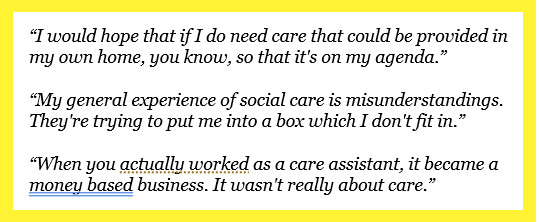Boris Johnson intends to “fix the problem of social care that every government has flunked for the last 30 years”. Hopefully he’s learnt the key lesson from those failed attempts - address the problems that matter to people themselves, and not those of “the system” (1/10)
Engage Britain’s Francis Elliott has been speaking to politicians at the heart of attempts to reform social care over the last 15 years. Read the full story on the 2010 “Death Tax”, the Dilnot cap, the ill-fated 2017 May manifesto in his essay here: https://engagebritain.org/social-care-reform-francis-elliott/">https://engagebritain.org/social-ca... (2/10)
The politicians have focused on a host of genuine problems – “bed blocking” between NHS and care system, the disjoint between “free at point of use” and “means-tested” regimes, etc. And a few purely political problems (eg the perception that there’s more votes in the NHS) (3/10)
But the main thing that comes out of their recollections is that the public have been the blockers. They don’t understand how the current system works, they don’t recognise the problems as policymakers see them and therefore they don’t rally behind the proposed solutions (4/10)
Take the run-up to 2017 election. Focus groups showed “the public wasn’t across the issues” but “when it was described to them, they liked [the proposals]”. Reformers take note - having to explain a problem in depth means your solution has no sustained political support! (5/10)
One response to this is that we need to “educate the public” – get them to see the world as policymakers do. Then surely they’ll see the wisdom in the various proposals? After 25 years in public policy, I’m afraid my response to this is a cynical “good luck” (6/10)
This gets public policy the wrong way around. Solutions have to start with problems that matter to people, and are easily recognised. Instead of asking “how do we persuade the public to fund the current system”, ask “what’s going to inspire people to get behind reform” (7/10)
As our health and care Community Conversations are showing, there& #39;s no shortage of starting points. I’ve pulled out a few quotes here (there& #39;s many others). The strong sense is of a system coming before people (whether those being cared for, their families or care workers) (8/10)
Our current system causes very real misery in people’s lives. But we all have loved ones, we know we’re have to look after them as they age, we know we’ll age ourselves. I’m certain that, starting from very human issues, we can build ways forward that make sense to people (9/10)

 Read on Twitter
Read on Twitter


